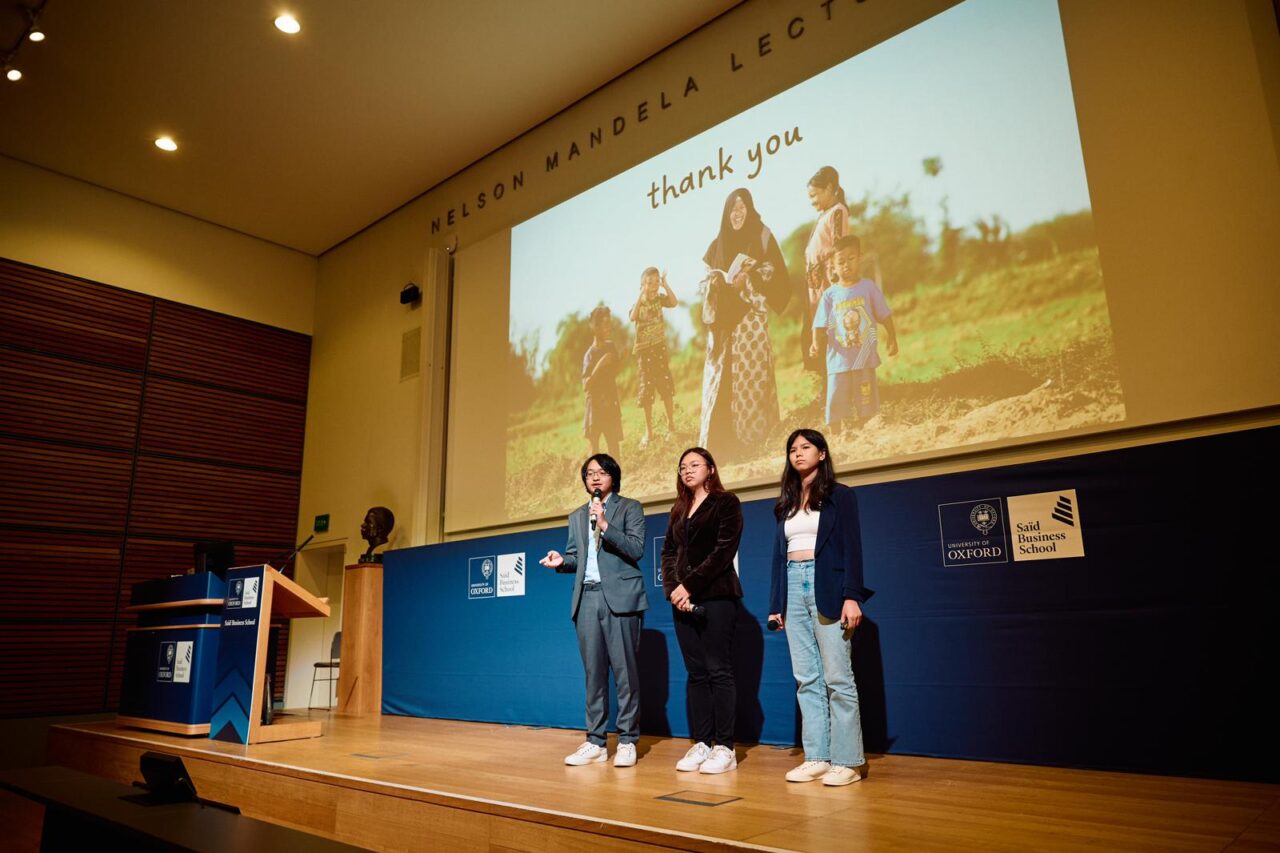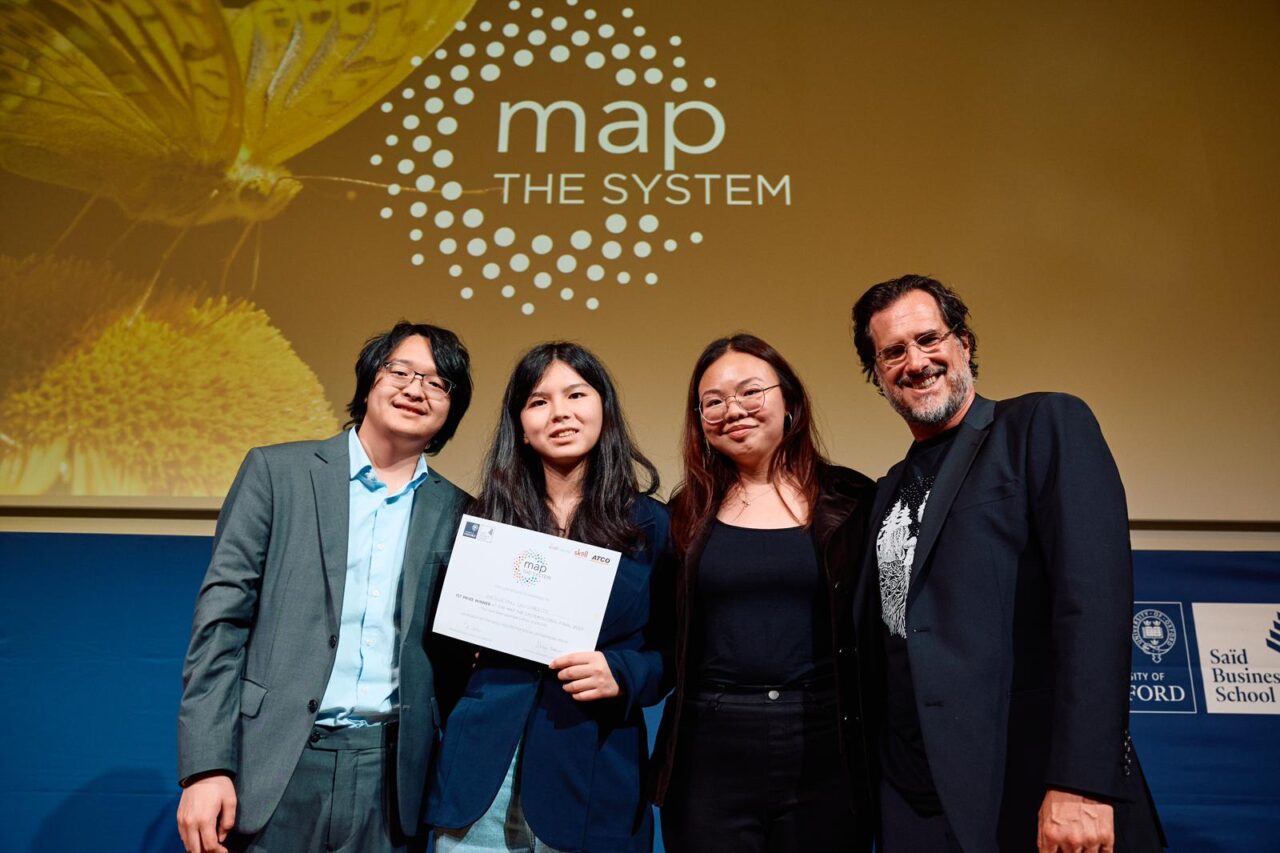Wesleyan Team Wins Global “Map the System” Challenge

Three Wesleyan students’ in-depth analysis of the causes of and possible solutions for the problem of child marriage in Indonesia won the University of Oxford’s 2023 “Map the System” Challenge.
The team of Sida Chu ‘26, Sun Boonbhati ‘26, and Valensia Tandeas ‘26 were among 900 that participated in the challenge, and were chosen as one of 12 finalists to present at the University of Oxford’s Global MTS Finals. The Wesleyan team became global champions for their project “No Longer Daughters: Child Marriage in Indonesia.”

“‘No Longer Daughters: Child Marriage in Indonesia’ stands out both for its depth of research, as well as the team’s extraordinary ability to articulate the systemic context allowing the issue to persist. The team distinctly understands the scale of complexity within their topic and are committed to outlining every possible factor for impact, from Indonesia to the rest of the world. They approached their research with clarity, tenacity, and remarkable commitment,” said Ahmed Badr ‘20, interim director of the Patricelli Center for Social Entrepreneurship, which sponsored the team in the competition.
The presentation noted how global movements impact the problem of child marriage. For example, the global demand for palm oil can lead to rapid environmental degradation in Indonesia, which leads to poverty. This then leads to more fathers selling child brides for dowries. At the same time, a lack of enforcement of laws prohibiting child marriage, cultural practices of child marriage, and a lack of education for girls also contributes to the problem of child brides.
“Systems theory provides a mechanism for embracing this complexity to identify leverage points for transformational change,” said faculty advisor Helen Poulos, Distinguished Professor of the College of the Environment and Environmental Studies.
Wesleyan has a multi-year history of reaching the MTS finals. However, this is the first time a team has won the global prize.
“This win is a testament to Sun, Valensia, and Sida’s phenomenal work, and an exciting example for fellow students interested in social impact and system mapping as a whole. This accomplishment shows that entrepreneurship is not limited to the single founder-model, but rather can take root at the system level, with far reaching impact across policy, law, and community engagement,” Badr said.
Each year, the Patricelli Center offers a course to support students interested in applying to the competition. This year the course was led by Aldrean Alogon ’23 and Aaron Leong ’25.
“The fact that this achievement came from a student-led forum is probably the most amazing thing about the win. It’s a testament to the importance of student fora on campus as an important part of our curriculum and course offerings at Wes. Aldrean Alogon and Aaron Leong were really responsible for coaching the team and preparing them to compete amongst almost 1,000 teams from over 20 countries,” Poulos said.
The Map the System class, competition, and systems theory provide mechanisms for dissecting seemingly complex problems into their components, Poulos explained.
“Many of the world’s problems today are highly complex, making it difficult for people to identify the root causes of today’s issues and the relationships among different parts of a social or ecological system. Often, small changes in the relationships in a system can trigger big system-wide changes, such as stock market crashes, pandemics, environmental degradation, for example,” Poulos said. “The Map the System competition and forum fosters a discovery process for students who want to be change-makers by offering a framework for identifying the root causes and pathways for tackling today’s social and environmental crises. Students who participate in the forum learn to view the world in a different way—a way that recognizes the interconnectedness of our social and environment systems.”
Badr sees the students’ efforts as a good example of what the Patricelli Center is intended to do—activating the power of students to turn their passions and interests into wide-ranging social impact.
“Whether that is starting a new organization, taking a new class, or preparing (and winning) a global competition. We support students as they explore their own leadership potential and match them with opportunities to grow and showcase their work across local, national, and international stages. The PCSE is proud to host the Map the System initiative, and we look forward to engaging more students as the program continues to grow,” Badr said.

